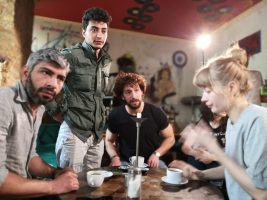The European Broadcasting Union successfuly screened two documentaries from Media Diversity Institute’s New Neighbours series on 23 November, at the BOZAR Centre for Fine Arts in Brussels. Both films examine the project’s core themes: how do refugees and migrants adjust to new surroundings, and how do old communities adjust to their new neighbours’ presence?
(See the trailer of all projects here).
The first film, Across the Road — World’s Apart follows the story of 94 year old Eva Sternhem-Peters, whose childhood was defined by leading the girl’s wing of the Nazi party’s youth movement. Over the course of her life, she had a political awakening and now shares her apartment with Amer Kassab, a young Syrian refugee. But not everyone in the neighborhood had the same journey. Across the street, a pub frequently welcomes clientele with German nationalist, anti-Muslim views. Could Amer’s presence change their mind? The second film Danielle’s Choice follows the story of Danielle, a Belgian woman who runs a robust platform of volunteers helping new refugees find accommodation and get on their feet. But in the process, her own family is left feeling forgotten. How can she reconcile her need to be a part of her own family, while creating a new one?

If you weren’t able to make it to our event, you can watch the films (and several others exploring similar themes) on the New Neighbours website here.
New Neighbours is a project that leads trainings with CSO activists on how to work with the journalists to improve perceptions of migrants and refugees in local media. Over the past year, it has produced a wealth of valuable media-monitoring resources and hosted successful trainings in Croatia, Italy, Spain, and Germany. It is lead by the European Broadcasting Union, and coordinated alongside COSPE, COMMIT, Community Media Forum in Europe (CMFE) in addition to Media Diversity Institute.
Nenad Radoja
Contrary to popular belief, Lorem Ipsum is not simply random text. It has roots in a piece of classical Latin literature from 45 BC, making it over 2000 years old. Richard McClintock, a Latin professor at Hampden-Sydney College in Virginia, looked up one of the more obscure Latin words, consectetur, from a Lorem Ipsum passage, and going through the cites of the word in classical literature, discovered the undoubtable source.